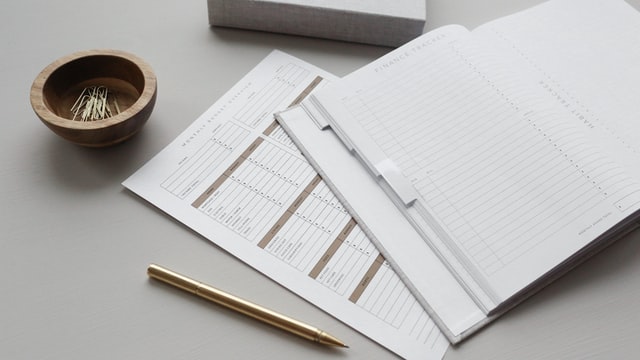There is no time like the present to start getting to grips with your finances, but not everyone is aware of how to get started. If you believe it’s time to begin organising your finances, here are ten rules that you can abide by to achieve better money management.
Rule 1. Eliminating Your Debt Should Be Your Main Priority

Debt can be debilitating both in terms of your finances and your mental well-being. Tackling your debt, and ultimately removing it, should be your main priority when getting to grips with your finances. Having significant debt can stifle your plans and prevent you from enjoying your life to the fullest.
When tackling your debt, you should deal with the obligations that have the highest interest rates. The reason for this is that high-interest debts mean that you’ll be paying more of your money to service the debt rather than reducing it. When you’ve paid off the higher-interest debts, you will have more money available to pay off the remainder of your debts. If you can, make overpayments on your debts, as doing so will reduce the time it takes to become debt-free.
Rule 2. Shop Around For Better Deals

You might not be aware of it, but you could be paying well over the odds for many of the services and insurances you pay. If you don’t check on what is going out of your account, you might find that the costs are creeping upwards. Try going through your direct debits and regular payments line by line and finding expenses that you can lower.
When a service is coming around for renewal, go online and check for better deals. You can find the best bargains by looking on comparison websites and finding cheaper providers. This simple exercise could end up saving you hundreds of pounds a year.
Rule 3. Look After Yourself

It is admirable that over half of British parents give up to £5,000 to their children to contribute to their savings. Providing such support to your children is natural, and it is also essential that you look after yourself.
You should think carefully about giving money away to your family when it harms your retirement plans. It is reasonable to put yourself ahead of others when you are preparing for your retirement years.
Rule 4. Invest As Well As Spend

It can be challenging to make ends meet each month, so putting something aside regularly may not be your top priority at the moment. However, there are some steps you can take to ensure that you invest some of your monthly income. Set up a small investment that leaves your account as soon as your salary arrives in your bank account. The rationale for doing this is that you will not have the opportunity to spend it if the money gets taken out straight away.
There are many types of investment you can make, and some will achieve higher returns, while others will have a lower risk. Cash ISAs are a good investment for the short-to-medium term. Interest rates might not be great, but ISAs are a tax-efficient way to invest your money. You can put £20,000 in your ISA each year, and you will not have to pay any tax on your returns. Before you invest in an ISA, you should check the notice required to withdraw your money.
To invest in your long-term future, there are few better investments than a pension scheme. The money you save into a pension is subject to tax-exemption at your marginal rate, up to the total amount of your salary or £20,000, whichever is the lower amount. Your pension funds will be locked until you are fifty-five, so it could have several decades to grow. While invested, your pension fund will benefit from compound interest growth, so making top-up payments in the early years can significantly boost your pension fund.
Rule 5. Don’t Turn Down Free Money

Few things in life are genuinely free, so you should grasp it when you get the opportunity to get some free money. One such chance is through a workplace pension. If you are in employment, aged twenty-two or over, and earn at least £10,000 a year, you should be enrolled in a workplace pension scheme. In addition to the contributions you make yourself, your employer also contributes to your future.
If you left this pension scheme, you would not receive these contributions from your boss. Therefore, you can consider these contributions as a freebie and seriously consider the implications of opting out of your scheme. Over your working life, these employer contributions can amount to tens of thousands of pounds, boosting your pension considerably.
Rule 6. Create A Budget And Stick To It

Creating a budget and continuously sticking to it takes some effort and willpower. However, once you get into the habit of budgeting, it will significantly improve your financial management. Budgeting also helps give you the confidence and peace of mind that you will need to manage your money and avoid debt.
Budgeting is straightforward, and there are also plenty of apps available if you need some assistance. Start by working out how much you have to spend each month. Then, calculate your essential spendings over a month, and allocate a proportion of your income to each expense. When you have established your budget, ensure you stick to it, and you will soon have a firm grip on your finances.
Rule 7. Expect the Unexpected

Regardless of how effective your budgeting is for your regular living expenses, there will always be occurrences that crop up unexpectedly. You can prepare for these unexpected costs by planning for them and creating an emergency fund. Your emergency fund should be sufficient to cover you for between three to six months of living expenses.
Rule 8. Get Your Finances Organised

Having your money in a single bank account may be convenient, but it is not the most effective way to organise your finances. Having separate accounts for bills, savings, emergency funds, and so on will help you manage your money more efficiently. It also allows you to budget more effectively, as you can quickly see the amount remaining for each category of your spending.
Rule 9. Watch Your Digital Spending

TV packages, broadband, mobile phones, and online subscriptions can all be considered essential spending, and they certainly enhance your life. However, the cost of these subscriptions tends to creep upwards, especially after the introductory period has ended. When it comes around to renewal time, shop around for better deals. Also, consider whether you are getting sufficient value from these subscriptions before parting with your hard-earned cash.
Rule 10. Ensure Your Pension Is Working For You

Simply putting money into a pension pot is not sufficient to maximise your retirement funds. You should be prepared to regularly check on your pension to ensure that it’s performing as it should be and that the management fees have not risen too much. Making a few tweaks to your pension over the years will help you maximise your pension’s potential. You might consider consulting a regulated financial advisor, as they will give you an accurate assessment of how your pension is performing.
Conclusion
Managing your money effectively takes effort and commitment, but it is worthwhile to help secure your financial future. Hopefully, following these ten rules will help you get into better money management habits. If you are considering your pension, speak to a regulated financial adviser like Portafina or, view the info at the Money Advice Service.
